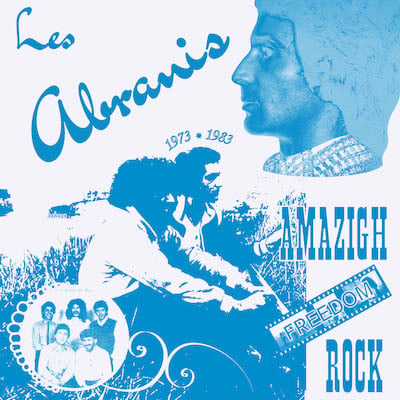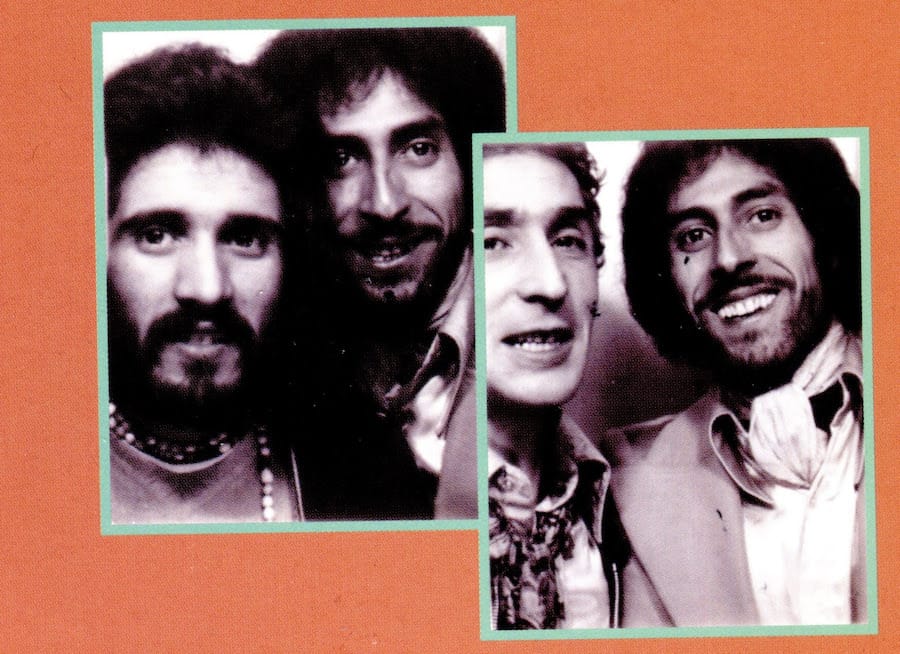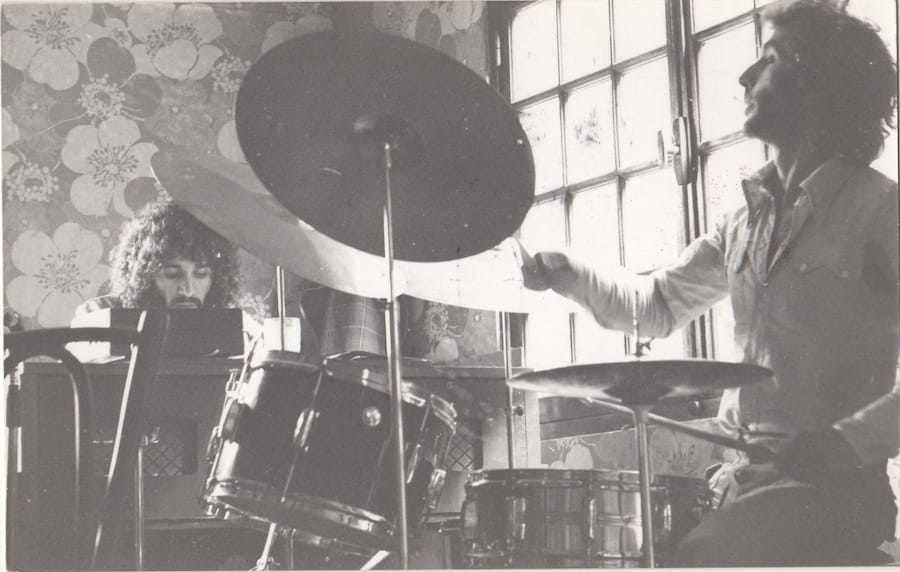
There is no doubt that the scintillating music on this latest compilation from Bongo Joe Records stands in its own right as a thrilling listening experience, but, as with other releases, delving into the background and contextualisation reaps further benefits.
It might be thought that Algeria’s independence from French colonial rule in 1962 ushered in a period of stability and freedom for its people. However, not all Algerians were (or indeed are) Arabs, and the new pro-Arabic constitution resulted in the repression of thousands of those who were not. One such group were the Berbers, self-named as Amazigh or Imazaighen, an ethnic group indigenous to the Maghreb, the Western part of the Arab world of western and central North Africa, known as the Barbary Coast in 18th and 19th century England.
The history of Les Abranis begins in the mid-1960s when two of the many thousands of exiles who had fled the repression stumbled upon each other in Paris. The two young Algerians, Abdelkader Chemini (aka Shamy El Baz) and Sid Mohand Tahar (aka Karim Abdenour), not only shared a love of rock music but were also Kabyle, natives of Kabylia, the Berber people from a mountainous region east of Algiers. In 1967, with the addition of Madi Mehdi and Samir Chabane, the band Les Abranis, Branis being a reference to a Berber tribe from Numidia, was born.

With James Brown, The Beatles, Jimi Hendrix and Fela Kuti, amongst others, being named by the band as influences, Paris also provided them with exposure to many other musical styles and genres. In line with their desire to promote a modern Algerian sound, over the course of their existence, and with many personnel changes, this pioneering group melded chaabi (traditional music), inspired by Berber melodies and rhythms, with folk, garage-rock, psych, Western rock, reggae, synth-pop disco, funk and fusion, in original compositions with Kabyle lyrics referencing democracy, exile, freedom, immigration and culture, which both celebrated and strengthened their Kabyle identity and heritage. By the end of the period covered by this release, Les Abranis had taken the Maghrebi music scene by storm both in Algeria and France, albeit not without some controversy and conflict in their home country.
The band’s musical transformation from garage rock and psychedelic experimentation in evidence at their outset through to the North African fusion output of the 1980s, via prog and jazz-rock and even disco, makes for a fascinating listen and historical study. However, for this compilation, the running order is non-chronological, which makes exploring this musical development a little more demanding.
Notwithstanding this, the chronology of the 11 tracks selected for this collection begins in 1973, with two singles originally released on the Oasis Disques label, neither of which appeared on albums. Both of these offerings exemplify the early experimentation with the mixing of the ethnic Kabyle melodies and vocals with Western psych-rock and garage styles. The first of these, Athedjaladde, with its mesmerising organ lines, repetitive half-a-dozen note guitar solos and spacey rhythms, is as hypnotic as the second, Ayetheri A L’Afjare, with its swirling, kaleidoscopic psychedelia, primal chanted vocals and syncopated hand-claps, one possible touchstone might be a Berber version of Sir Robin & The Longbowmen.
These two tracks have further significance in the history of Les Abranis. Invited in 1973 to perform at the Festival of Modern Algerian Song in Algiers, broadcast live on national tv and radio, these two garage tracks, performed by the ex-patriate Berber hippies in Kabyle, were ecstatically received by those present in the audience, but not so by the organisers who pulled the plug on them after the third number. The “rockabyle” music of the group was considered a threat to conservative Algeria. Still, this performance had established their musical credentials and reputation as they returned to an excited and anticipatory France.
Despite further successful live performances in France and Algeria, at the end of their 1975 tour in the latter country, the band split upon their return to Paris, with Karim and Shamy only hiring musicians occasionally when needed for recordings or tours.

Over the next few years, the complexity of their arrangements increased as they moved away from the early psychedelia and garage-rock and began to be more creative with their Berber/Kabyle musical roots, infusing them with prog-rock, jazz, Kosmiche and nascent electronic influences. Up to 1983, four LPs and several singles were released, from which the remainder of the tracks here are taken.
Chenar Le Blues, a big hit on Algerian radio, first released on the Les Abranis 1977 LP on the Disques Bordj El Phen label and later, in 1990, on the cassette-only Amezruy Usrid, is very much a Doors-sounding and inspired number which perfectly encapsulated the cross-over between the blues and the music of their roots.
Similarly, their 1978 Imeté Tayrri (Larmes D’amour) album, also released on Disques Bordj El Phen, is represented by one single track, the lavishly produced and mixed by Jean-Michel Hervé, El Ououm Agui (Cette Génération), re-titled on this compilation as El Guoum Agui. The opening chunky guitar chords are in the Western rock mould, as are the electric guitar solo breaks, whilst the vocals evoke the Middle East. Add into the mix the Indian sub-continent string sounds provided by members of the Paris Opera Orchestra, and it is no surprise that this album expanded interest in Les Abranis beyond their growing fan base to a much broader and more influential audience.
It was not until 1981, however, that the group released their third LP, Musique Algérienne d’Aujourd’hui – Amekhssa Dh’Yizem, this time on Numidie Music, a label specialising in Kabyle music, and with it a further exploration of the traditional and experimental. Originally released as a single in 1980, Therrza Rathwenza, with its military drum beats and Duane Eddy guitar sounds weaving around a spacey synthesiser, also features Dionysian male and female vocals, the totality of which creates a synth-disco buzz in which, perhaps perversely, the lyrics describe the artists’ daily misfortunes. Taken from the same album, Thilelli, which translates as ‘freedom’ is an instrumental track positively throbbing with percussion, more twangy and wah-wah guitar effects, ethereal keys and layer-upon-layer of synths which reaffirms their support for the Amazigh cause.
Despite further successful touring, including once more in Algeria, they were unable to find a label for their fourth album and decided to release it themselves. With Corsican drummer André “Dédé” Ceccaelli offering his services for free and bringing with him other top studio and prog-rock legends, the resulting album became a best-seller. No less than five of the tracks from this 1983 LP, the confusingly titled Album No.1, have been selected for inclusion on this compilation.
Funky bass lines, skittish guitar and sonorous vocals adorn the tremendously upbeat Akoudar. Sea-shore/wind sound effects book-end Avehri, a reggae-infused piece replete with dub-bass, echoey guitars and simple keyboard patterns, once again illustrating Les Abranis’s enthusiasm for melding their traditional North African melodies with disparate music styles.
The innovative arrangements of Achethkhii lend to one of the album’s more intriguing pieces. Listen carefully, and echoes of Pink Floyd-like guitar solos might be perceived amidst the bass and drums, underscoring other high-pitched guitars, all of which are in stark contrast to the vocals, which firmly locate the overall sound in a North African geographical location far from the Cambridge of David Gilmour.
This fusion of cultures continues on both Id Ed Was, a celebratory explosion of joy and catchy melodies evoking the frenetic activity of a bazaar, and the album closer (available on digital and CD formats only), Mmliyi Kan, with its rippling and shimmering opening cascade of guitar notes giving way to impassioned, chant-like vocals.
Even before the success of Album No.1, wider interest and enthusiasm for Kabyle music had begun to wane, and following its release, there was a new kid on the block in the form of the electrified folk of Algerian rai music, and Les Abranis stopped making music for over a decade, only returning to celebrate their 20th anniversary with a new album released in 1993.
Amazigh Freedom Rock 1973-1983 is a significant release bringing the joyous and vibrant fusion of Berber Kabyle roots music and modern Western styles, in the form of Les Abranis’ “rockabyle”, to a wider audience. Whilst this reviewer would have liked more from the group’s first two LPs released on Disques Bordj El Phen, this release is a fine introduction to the earlier work of an important band and complements 1997’s CD compilation La Saga des Abranis 1978-1993, from Blue Silver.
Amazigh Freedom Rock 1973-1983 releases 28 April 2023, via Bongo Joe Records – Bandcamp

